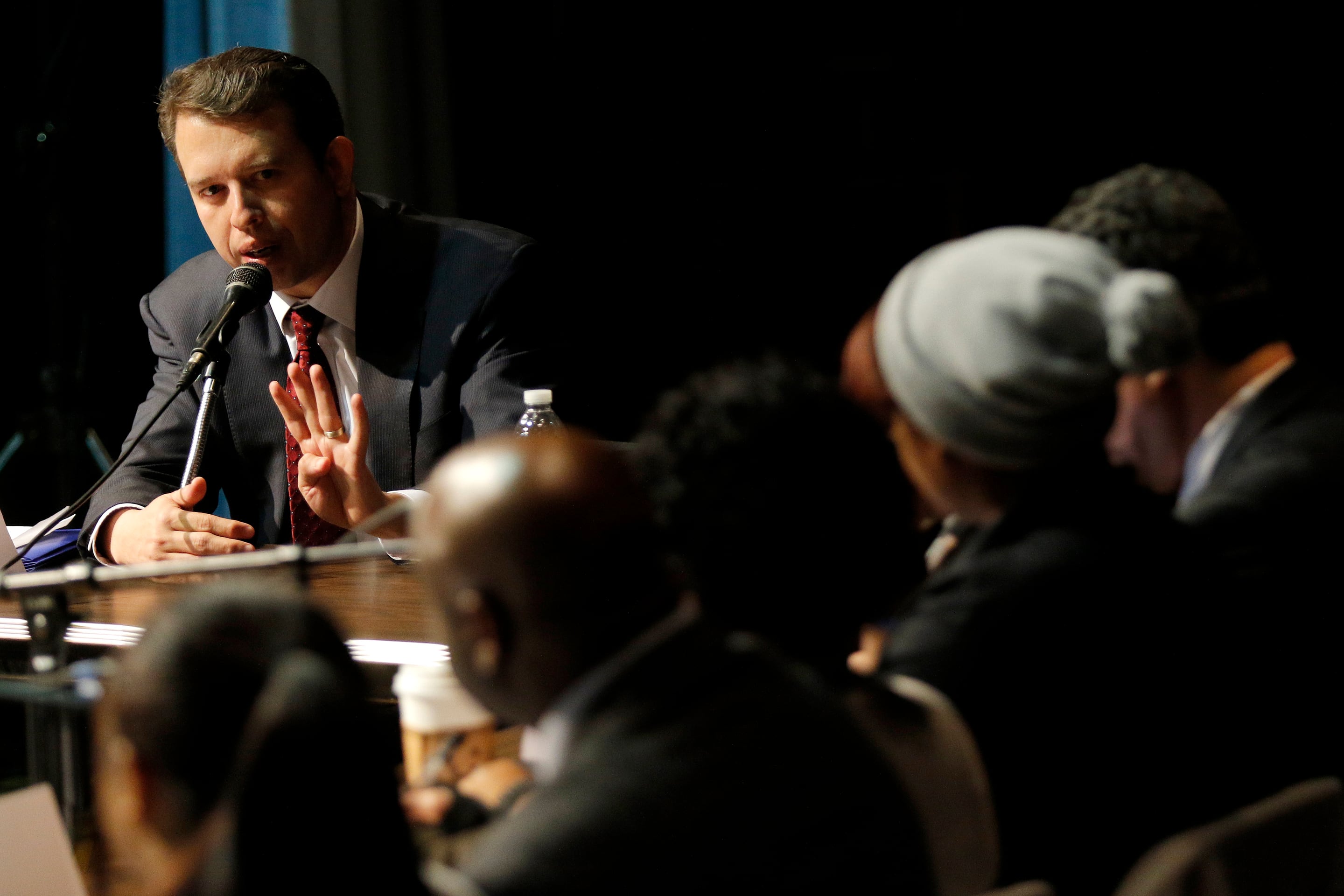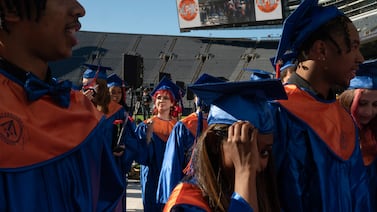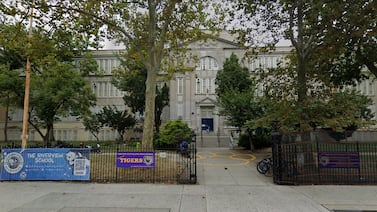Pedro Martinez, a Chicago Public Schools graduate who now leads the San Antonio Independent School District, is Mayor Lori Lightfoot’s pick to be the next Chicago schools chief.
Lightfoot made the announcement Wednesday morning at Benito Juarez High School, Martinez’s alma mater. Martinez is the first Latino to be permanently appointed as the city’s schools chief.
Martinez said Wednesday that he planned to start the last week of September, but the mayor said it was too early to disclose terms of his contract, including his compensation. “We haven’t inked the deal but we’ve agreed on the broad strokes of the terms,” Lightfoot said in response to questions.
Recognizing multiple family members in the crowd, Martinez said Chicago welcomed his immigrant family when he was child and that he was returning to his “dream job.” As a youngster coming from Mexico at the age of 5, “Chicago embraced us as immigrants. It was the churches here in Pilsen that embraced my family.”
Martinez, whose name began circulating as a finalist in August, recently made news when he issued a mask mandate and a staff vaccination mandate, defying Texas Gov. Greg Abbott’s executive order banning public entities from requiring masks or COVID shots. In response, Texas Attorney General Ken Paxton is taking the district to court.
Before taking on superintendent roles in Texas and one of Nevada’s largest school districts, Martinez served as chief financial officer for Chicago Public Schools between 2003 and 2009, under then-CEO Arne Duncan. In his tenure as San Antonio superintendent, Martinez drew national attention for his push to better integrate the school district, which serves about 50,000 students.
Martinez will be Chicago’s seventh schools CEO in the last 10 years, a volatile decade that has brought two teacher strikes, a pandemic, a budget crisis, and declining enrollment — but also marked academic improvements, including climbing graduation rates and growth on nationally normed tests that outpaced most other big cities. His predecessor, Janice Jackson, who got a raise in the final months of her three-and-a-half year tenure to earn $300,000, was credited with helping the district reach some stability.
Jackson’s departure spurred other vacancies in Chicago Public Schools leadership. Martinez is expected to appoint two key roles early in his tenure: the district’s chief operating officer and chief education officer. Both positions currently are held by interim administrators.
Non-educator plans to fight COVID, poverty
The new CEO and his leadership team will helm the country’s third largest district as it reopens for full-time in-person learning after 15 months of virtual learning for most students and tackles the academic and mental health fallout from the pandemic. Martinez will face the task of striking a more collaborative relationship with the city’s outspoken teachers union leadership after a year of intense strife over school reopening.
“It is clear that Mr. Martinez has a tall task ahead of him from day one,” the Chicago Teachers Union said in a statement after the appointment was announced. “Despite having no classroom or in-school experience, Mr. Martinez will have to be an independent thinker, a far better partner and collaborator than Mayor Lightfoot, and work with stakeholders to keep them safe, earn their trust and meet high expectations.”
Martinez’s own path to school administration was forged through accounting and finance. Asked Wednesday about hiring someone with an MBA and not a background in classroom management, Lightfoot said his track record and history advocating for children living in poverty made him the right fit — and that she was particularly impressed by his decision to defy the Texas order banning mask mandates.
”To stand up and say no, I stand with my kids, I think he’s going to be a great leader for CPS,” said Lightfoot.
Martinez said Wednesday that his goal is to unite a fractured school district. “The enemy is COVID. The enemy is poverty. We are on the same side.”
In taking the job, Martinez will also have to confront challenges that preceded the pandemic: stubborn racial and socioeconomic disparities, deep mistrust of the district in some communities, and declining enrollment that has strained some campuses’ ability to offer a full array of services and support to students.
Still, in an interview with Chalkbeat earlier this summer, Martinez said he could not pass up on the Chicago opportunity.
“It’s where I grew up; it’s where I went to school,” he said. “It was my first role in K-12. It really launched my pathway to becoming a superintendent.”
“It’s very personal to me,” Martinez added. “Because it is my hometown, it was something I needed to explore.”
He’ll also confront a new political reality: uncertainty brought by a newly signed law that establishes school board elections starting in 2024, a blow to the influence and reach of the mayor and her hand-picked CEOs when it comes to education policy.
Coming back to Chicago
A native of Mexico, Martinez earned his bachelor’s and master’s degrees from the University of Illinois at Urbana-Champaign and DePaul University after graduation from Juarez. Like interim CEO José Torres, who has been running the district since June, Martinez is a graduate of the Broad Superintendents Academy, a reform-era training program that has drawn some criticism for taking a business model approach to public education.
In San Antonio, he helped launch the district’s first network of Centers for Applied Science and Technology — a network of high schools with technology-centered curriculums — and started a slew of dual language programs. He earns about $315,000 a year under a contract set to expire in 2025.
Chicago launched a national search for a new schools chief last spring after Jackson — citing the intense pressures of steering the district through the pandemic and an acrimonious reopening standoff — announced she would step down at the end of June. Since then, Torres, a former Elgin superintendent, has served in the interim role.
The city contracted Illinois-based search firm BWP and Associates to lead the search, setting an aggressive deadline of late July.
The opening drew 25 applications by June. BWP vetted the candidates and forwarded a list of frontrunners to a district search committee made up of school board members, employees, and residents, which selected two finalists, including Martinez, to be interviewed by Lightfoot and board President Miguel del Valle.
The mayor promised an unprecedented level of public engagement and transparency in selecting the schools chief — a process that has taken place behind closed doors in recent years and, under previous mayors, often produced leaders without a deep education background.
But Chicago Public Schools did not respond to repeated requests to share the names of committee members. The district also did not make finalist identities public, citing the need to protect applicants’ confidentiality. And although the district and its search firm promised biweekly updates on the search would be regularly posted online, the summer brought stretches of almost two months without any such updates.
Martinez said in a recent interview about reopening that the past few months he has been intensely focused on drafting backup plans to keep schools open should there be a resurgence of COVID rates. And he’s been consulting with parents and educators about how to use federal emergency funding.
Among his priorities are increasing mental health staffing in schools, reducing class sizes, and adding 30 instructional days to the school year to make up for missed learning.
“When we asked parents about how we should use our federal funds, the No. 1 need they described was mental health,” he said. “I was going to focus a lot more on academics, but I had to listen to that. We put mental-health specialists in every one of our schools.”







